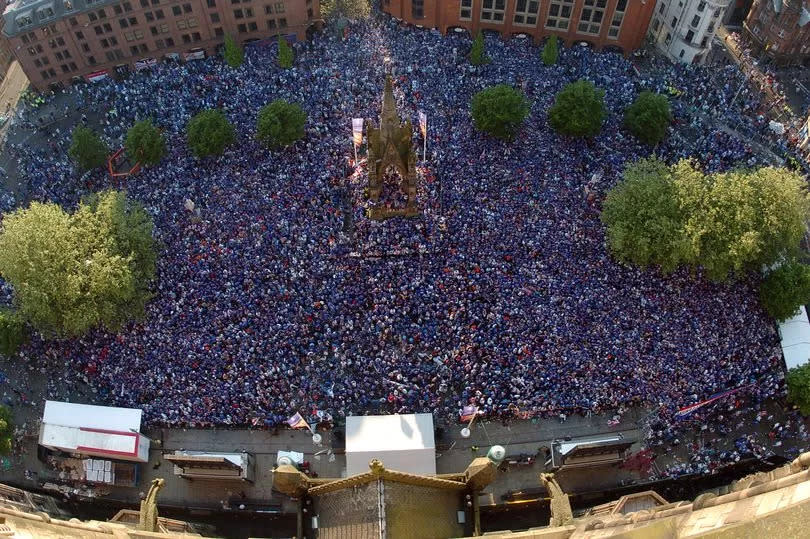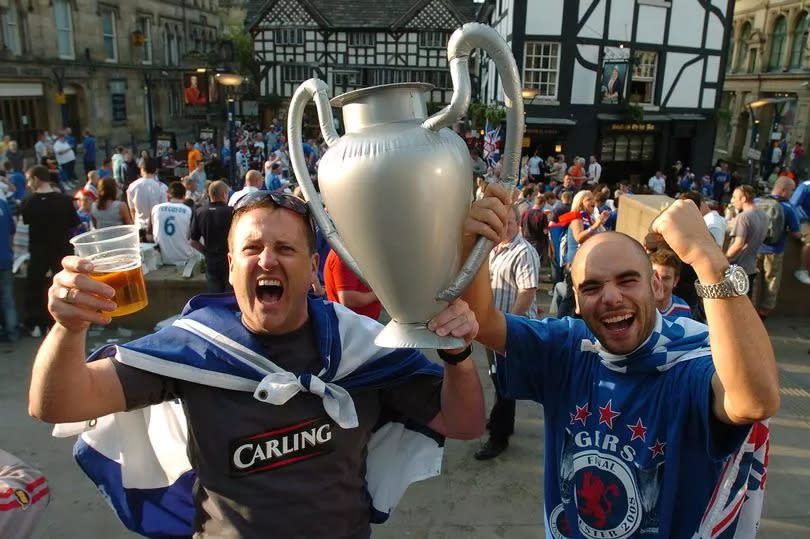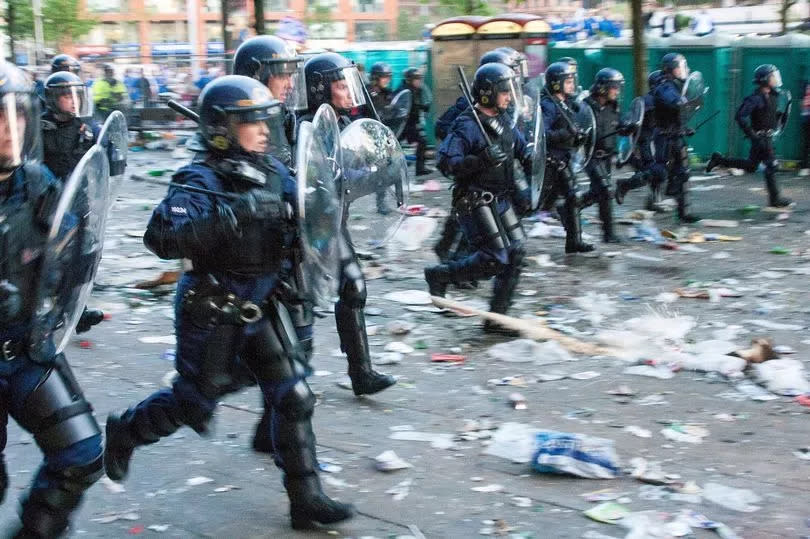It promised a 'carnival atmosphere'. Instead it was Manchester's worst night of violence

The Manchester Evening News dubbed it the 'Battle of Piccadilly'. An experienced police officer described it, simply, as 'frightening', whereas for then Prime Minister Gordon Brown it was a 'disgrace'.
On the morning of Wednesday, May 14, 2008, some 150,000 Glasgow Rangers fans flooded into Manchester for the UEFA Cup final. It was their club's first European final in 36 years and spirits were understandably high.
But what should have been a day of celebration would descend into what a judge would later describe as the 'worst night of violence and destruction suffered by Manchester city centre since the Blitz'.
READ MORE:
Behind the scenes the authorities had been making preparations ever since Rangers booked their place in the final against Russian side Zenit St Petersburg a fortnight earlier. Initially Ibrox officials expected somewhere between 60-70,000 fans to make the trip south.
But within days that estimate was being revised upwards. With the Etihad then having a capacity of around 43,000, fans were urged not to travel without a ticket. The plea fell on deaf ears.
By May 9, police were being told up to 100,000 supporters could turn up. But even that figure was dwarfed on the day itself.

As workers made their way into the office on the morning of the final, the city centre was already beginning to fill up with football fans. By midday Albert Square and Piccadilly Gardens were seas of blue.
As chants rang out, the 'tartan invasion' of Manchester got into full swing. Supermarkets were emptied of alcohol as thousands of fans turned the city centre into a huge beer garden.
Legend has it one particularly inebriated supporter, carrying a crate of beer on his shoulder, tried to 'check in' at the old M.E.N. offices at Spinningfields and took some convincing that it wasn't in fact at his hotel. It seemed the 'carnival atmosphere' the authorities hoped for was becoming a reality.

But as the drink flowed, things began to turn ugly. According to a report later released by Manchester council, by 5pm merchandise stalls were 'overrun', frightened staff had fled and 'the tills were smashed and everything stolen'. A Carlsberg tent in Piccadilly Gardens was 'looted'.
It was a tinderbox. And it only took one small spark to light the fuse.
Fan zones had been set up around the city centre to accommodate the ticketless supporters. But when the big screen in Piccadilly Gardens failed moments before kick-off violence erupted.
As engineers desperately tried to restore the picture they were pelted with bottles. Riot police were called in to try and contain the disorder, but they were vastly outnumbered.

With the screen now damaged beyond repair, hundreds of disgruntled fans turned their attention to the cops. Piccadilly Gardens became a 'battleground' as they went on the rampage
Shops and cars were vandalised. Fans fought running battles with police through the streets, hurling missiles and throwing punches.
A number of police officers were surrounded and beaten up. Frightening CCTV footage emerged of a small group of officers being chased by a mob.

One of them, Pc John Goodwin bravely stood his ground and was beaten to the floor. In another incident Pc Mick Regan, was attacked by a gang of 20 men whilst lying on the ground.
He later described the violence as 'unbelievable'. "It was frightening, on a different scale from any other match I have worked in my 23-year career," he added.
Rioting broke out in the Piccadilly Gardens, Newton Street and Market Street parts of town. Streets were strewn with litter and broken glass as the trouble continued until the early hours.
The following day the recriminations began. The PM described condemned clashes between riot police and fans as a 'disgrace'. "It was a minority and it was completely unacceptable," he added.
When the dust had settled 39 police officers were injured and the same number of Rangers fans were arrested for offences including public disorder, assault and possession of an offensive weapon. Dozens of complaints were also made about police using excessive force, with one former soldier claiming to have been beaten with truncheons.
GMP later defended their response, with assistant Chief Constable Justine Curran saying officers acted appropriately during what she described a 'challenging' situation. More than 5,000 hours of CCTV and mobile phone footage was pored over to find those responsible for the violence.
Appeals were launched on Crimewatch and in the pages of the Rangers matchday programme. And more than two years later a dozen hooligans were finally brought to justice.
Sentencing all but one of them to prison, Judge Andrew Blake, said: "By 8.45pm that evening Piccadilly Gardens had become a battleground. Riot police were deployed and struggled to contain the trouble and restore order.
"What followed was the worst night of violence and destruction suffered by Manchester city centre since The Blitz. The damage, the filth and the litter was apparent to all who arrived in the city for work the next morning.
"It had nothing to do with football rivalry", he added, "and everything to do with drink."

 Yahoo News
Yahoo News 
